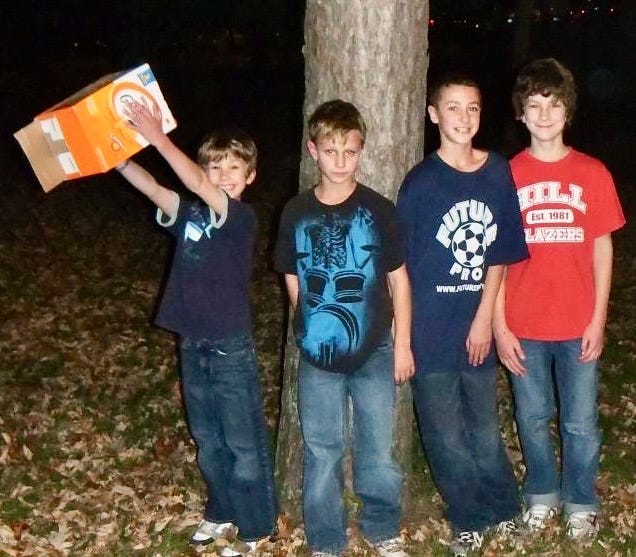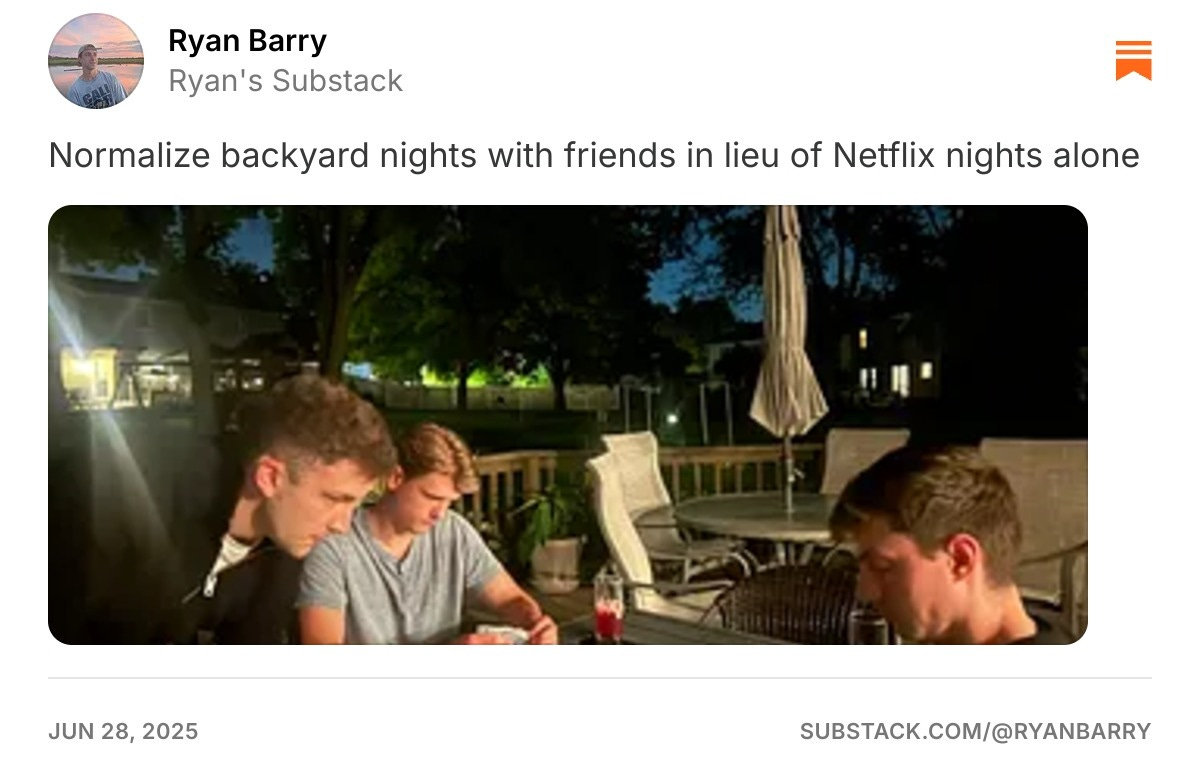All I’ve learned and experienced recently—after returning home from my five-year sojourn in Charleston, South Carolina—seems to reinforce the fact that responsibility makes life worth living . . .
More specifically, that communal duty is the foundation of meaning.
Having been home for more than a month now, I’ve noticed a stark difference in how I feel (that is, better), despite no longer living in a “paradisical” environment . . . a feeling I’d attribute to, among several other things, the fact that I’m giving more time to people I love than when I was in Charleston.
Indeed, the fact that I can feel so much better in the suburbs of Chicago (okay, to be fair, it’s not like they’re a dump) than in a dreamy place like Charleston has made indisputably evident something I’ve long known within: it is not those flashy, external things that make life good (as many young’uns mistakenly think), but that those quiet, lasting things do. Because whenever I don’t have plans, especially and obviously with friends and family, I feel a little empty on the inside.
Of course, it’s fun to have fun and do “cool” things. And yes, I like to be on my own a lot of the time. And yes, I’ve got to (just as we all do) work a whole lot—and it is this work that makes way for enjoyable things to be enjoyed.
But if I haven’t got some communal thing to look forward to, I just don’t feel good. I feel a little hopeless. A little sad.
It’s not that companionship invigorates me, per se—as it can often be draining, especially considering my “introverted” style—but that it gives me something to look forward to (perhaps because there is, bound to social interaction, an element of adventure otherwise absent when flying solo), that there is attached to it this underlying element of positivity and hope unavailable elsewhere. (Better yet, any sort of work in the name of service to others seems to be sustained by a fuel far more mighty than whatever drives our superficial desires.)
Family get-togethers, neighborhood parties, nights with the boys, nights on the town, vacations, ski trips, lake weekends, movie nights, bowling nights, soccer teams, swim teams, so on and so forth. Whatever your jam is—that’s what it’s all about. These moments are what make life worth living.
Without them, almost all of us will come to feel, rather quickly, like something is missing . . . And we will, in turn, do everything we can to supplement (or silence) this lack as fast as possible.
If you’re enjoying this post, consider taking out a free or paid subscription:
I’m sure this isn’t news to most. Or at least to the more seasoned folks. I write this today only because it is something I’ve learned recently, having forgone my communal duties in lieu of that previously mentioned sojourn. And because it seems to be something a lot of people my age don’t totally understand.
I suppose what’s so confusing about this for all of us young’uns is that we’ve got to work for these more meaningful things. Directly, as my father always told me—meaning that we’ve got to reach out and make plans and forgo Netflix on some nights so we may instead sit around a campfire—but also indirectly, because in order to “be there” for others, we’ve got to cultivate this security within.
And to cultivate that security, we need to work.
Indeed, just because these communal experiences are what it’s all about doesn’t mean that we should spend as much time as possible “doing” them. You know?
They’re only good because (1) we don’t spend the majority of our time doing them, and (2) because we’ve got to earn them. The good life, it seems, is composed mostly of work (especially when you’re young)—like 80%+ work. (And the rest of it is enjoying the other 20%.)
This doesn’t mean that work is something to loathe. In fact, if you go about it a certain way, work can become something you look forward to, something you voluntarily charge head-first towards, something that invigorates your spirit because you know it is the medium through which you’ll forge that much-needed security.
At the same time, however, we must simultaneously not forget what it is we’re working so hard for (that being others), both so we may be sustained in our efforts and so that we don’t fall into the trap of thinking that life is only about “progress”—or worse, that a certain degree of progress will bring us to some worldly state of salvation.
It seems that a lot of young people these days, myself included, are dead set on making progress. And, I mean, it’s kind of understandable, seeing that my generation’s dollar is worth less than both our parents’ and our grandparents’ (and probably several generations more removed) dollar. If an individual wants to be the breadwinner these days, they can’t just get any old job. Especially—as is the case for many—if they want to at the bare minimum match for their children the living standards they were raised in.
That being said, it’s not like we’re utterly screwed. And really, I don’t think inflation is the central reason my generation seems to be having a harder time spending time with friends.
The central reason, I believe, is that we all prefer screens to socialization.
To be completely honest, though, it doesn’t matter. Because the fact is that I could go on and on about what I think the problem is.
What really matters is what we do about it. And no, I’m not advocating for some sort of protest or pop-culture movement. Because what’s tangible and practical—what I’m speaking to in this little essay—is the quality of life for the individual. In other words, I don’t say all this to preach about what I think is wrong with the world; I say it because, as obvious as my message may seem, it’s what a lot of individual people’s lives are missing.
Meaning that the real question here is, what are you doing to cultivate community and “be there” for your people?
I saw this short bit from a Tony Robbins talk a while back, and it stuck with me forever:
A guy was struggling with his marriage, and Tony asked him something like, out of ten, how much effort have you put into making your marriage work? And the guy responded with something like a six (I don’t remember) . . . The point being that so often we have these relationship/community problems, but we simultaneously fail to do everything we could to support the other person/cultivate the community. Because we think they ought to do it first. We think that if they’re not giving, then we shouldn’t either. We want to be invited, though we don’t want to have to throw the party.
But this isn’t love. Love isn’t conditional. Love isn’t transactional. (And I’m not just talking about romantic relationships here.)
If I speak in the tongues of men or of angels, but do not have love, I am only a resounding gong or a clanging cymbal. If I have the gift of prophecy and can fathom all mysteries and all knowledge, and if I have a faith that can move mountains, but do not have love, I am nothing. If I give all I possess to the poor and give over my body to hardship that I may boast, but do not have love, I gain nothing.
Love is patient, love is kind. It does not envy, it does not boast, it is not proud. It does not dishonor others, it is not self-seeking, it is not easily angered, it keeps no record of wrongs. Love does not delight in evil but rejoices with the truth. It always protects, always trusts, always hopes, always perseveres.
1 Corinthians 13:1-7
You see, everyone knows that you get what you give, but so many are unwilling to be the person to put themselves out there first. And I get it: perhaps you’ve been screwed, perhaps others have done you dirty, perhaps you’ve extended an arm of grace and had it cut off.
And the truth is that that’s pain. That’s just how it goes sometimes. That’s the cost of doing business. That’s the price you pay to love.
The question is, are you going to let a single person dictate the rest of your life? Are you going to give to one person the power to harden your heart forever?
I guess it’s not so easy for us young people to know firsthand how important it is to invest in these relationships, considering that they have always been more or less of a given.
Especially when life gets busy, which it inevitably does, what we’re most tempted to do is withdraw, to retract from our communal ties because we feel we’d be better off floating around, nothing compelling us to be anywhere at any point in time. And this might take some of the weight off our shoulders for a bit—certainly, after two decades in the school system, during which the majority of our time was dictated, it can be easy to conflate duty with burden, and responsibility with restraint.
But then we go out into the world, and try to float around like a leaf, because we think life is all about the breeze, this easier state of being in which we can just drift according to our impulses . . . And at some point, if we’re lucky, we learn it’s best to be tied to something, because it is that rope that orients us and helps us distinguish good from bad—and feel good, and not so bad.
It often isn’t until everyone is out there in the world on their own, perhaps thrown for one reason or another into a dire situation, perhaps losing something that they’ll never have back, that their eyes may be opened.
So I guess this is just how life goes. Things are given, and then they are forgotten about, and then the lesson must be learned again. And this process repeats itself, both microcosmically and intergalactically, over and over again, with no end in sight.
Try as we may to learn from the mistakes of others, we tend not to. Though things are a little more expensive, we are not, in reality, so different from our parents, nor our grandparents. Some people keep in touch, some people fall off. There is no way to know who will do what. All we can do is try. And so, all I can really say is, spend time with your people.
Love never fails. But where there are prophecies, they will cease; where there are tongues, they will be stilled; where there is knowledge, it will pass away. For we know in part and we prophesy in part, but when completeness comes, what is in part disappears. When I was a child, I talked like a child, I thought like a child, I reasoned like a child. When I became a man, I put the ways of childhood behind me. For now we see only a reflection as in a mirror; then we shall see face to face. Now I know in part; then I shall know fully, even as I am fully known.
And now these three remain: faith, hope and love. But the greatest of these is love.
1 Corinthians 13:8-13
Until next time,
RB



